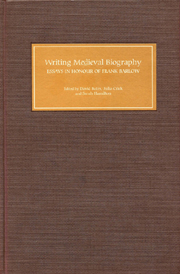Book contents
- Frontmatter
- Contents
- Preface
- List of Abbreviations
- Introduction
- 1 Did Charlemagne have a Private Life?
- 2 Bones for Historians: Putting the Body back into Biography
- 3 ‘Carriers of the Truth’: Writing the Biographies of Anglo-Saxon Female Saints
- 4 Alfred and his Biographers: Images and Imagination
- 5 Re-Reading King Æthelred the Unready
- 6 Writing the Biography of Eleventh-Century Queens
- 7 The Flemish Contribution to Biographical Writing in England in the Eleventh Century
- 8 The Conqueror's Earliest Historians and the Writing of his Biography
- 9 Secular Propaganda and Aristocratic Values: The Autobiographies of Count Fulk le Réchin of Anjou and Count William of Poitou, Duke of Aquitaine
- 10 Reading the Signs: Bernard of Clairvaux and his Miracles
- 11 Arnulf's Mentor: Geoffrey of Léves, Bishop of Chartres
- 12 The Empress Matilda as a Subject for Biography
- 13 The Gesta Stephani
- 14 Writing the Biography of Roger of Howden, King's Clerk and Chronicler
- 15 Writing a Biography in the Thirteenth Century: The Construction and Composition of the ‘History of William Marshal’
- 16 The Strange Case of the Missing Biographies: The Lives of the Plantagenet Kings of England 1154–1272
- Index
Introduction
Published online by Cambridge University Press: 12 September 2012
- Frontmatter
- Contents
- Preface
- List of Abbreviations
- Introduction
- 1 Did Charlemagne have a Private Life?
- 2 Bones for Historians: Putting the Body back into Biography
- 3 ‘Carriers of the Truth’: Writing the Biographies of Anglo-Saxon Female Saints
- 4 Alfred and his Biographers: Images and Imagination
- 5 Re-Reading King Æthelred the Unready
- 6 Writing the Biography of Eleventh-Century Queens
- 7 The Flemish Contribution to Biographical Writing in England in the Eleventh Century
- 8 The Conqueror's Earliest Historians and the Writing of his Biography
- 9 Secular Propaganda and Aristocratic Values: The Autobiographies of Count Fulk le Réchin of Anjou and Count William of Poitou, Duke of Aquitaine
- 10 Reading the Signs: Bernard of Clairvaux and his Miracles
- 11 Arnulf's Mentor: Geoffrey of Léves, Bishop of Chartres
- 12 The Empress Matilda as a Subject for Biography
- 13 The Gesta Stephani
- 14 Writing the Biography of Roger of Howden, King's Clerk and Chronicler
- 15 Writing a Biography in the Thirteenth Century: The Construction and Composition of the ‘History of William Marshal’
- 16 The Strange Case of the Missing Biographies: The Lives of the Plantagenet Kings of England 1154–1272
- Index
Summary
The classical art of life-writing persuasion always embraced persuasion as much as verisimilitude. Developed in ancient Athens to celebrate the dead and exemplify the morality of the philosophers, perpetuated in Rome to inspire public virtue and commemorate great men, biography resembled other forms of portraiture, stylised and conventional perhaps, but exposing none the less the artist's intentions, his skill, and his relations with both his subject and the conventions of his genre. The idealising tendencies of the pagan bios and vita were reinforced by a complementary tradition, that of epideictic rhetoric, formulated by Aristotle in his Rhetoric I.9 and summarised by Cicero in Ad Herennium. Here orators were to attribute praise and blame according to received categories, heightening observed characteristics to rhetorical and moral effect ‘for all speakers praise or blame in regard to existing qualities, but they also make use of other things, both reminding [the audience] of the past and projecting the course of the future’. Biography reached the libraries of the early Middle Ages in processed form, contained by the efforts of late antique hagiographers who rendered the old tradition in the light of Christian philosophy and created a canon for the consumption of contemporaries and future readers. Like the pagan bios and vita, the lives of saints offered anecdote and exemplification, they commemorated departed heroes, linking the living and the dead, but after the end of antiquity increasingly they served to bridge a cultural gulf, giving human form to a Christian message from an increasingly alien culture.
- Type
- Chapter
- Information
- Writing Medieval Biography, 750–1250Essays in Honour of Frank Barlow, pp. 1 - 14Publisher: Boydell & BrewerPrint publication year: 2006



